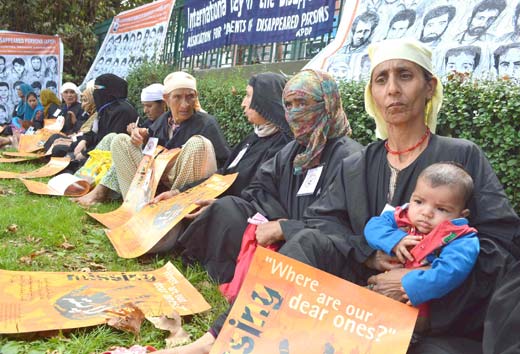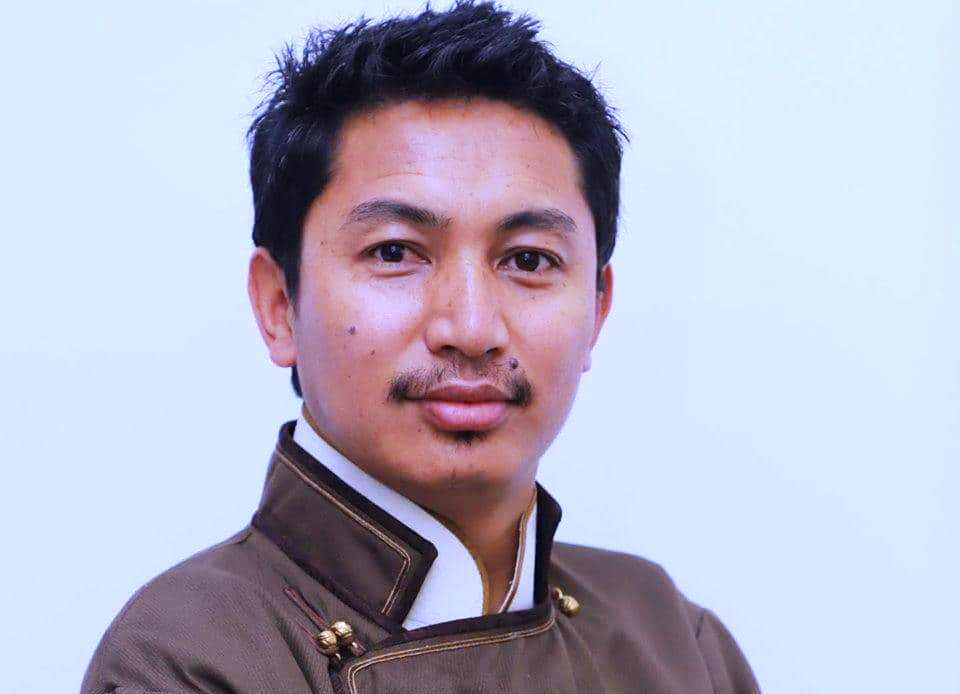Happy with the result Saima, Parveena’s daughter, says that they presently are not only concerned about the disappeared population but the survival of their families is erupting as a bigger challenge.
APDP is handling school and medical expenses of the members registered with them. There are about 1000 of them.
Shamina’s husband, Shabir Ahmed, a fruit vendor, was picked up by the Army from his home. It was 22 January 2000, she remembers. Their son was 18 months old and daughter 15 days old.
Having a caesarian just 15 days ago, Shamima had to run through streets filled with rain water, chasing the Army vehicles, pleading them to leave her husband but failed. She says army men of 6 Rashtriya Rifles picked up her husband.
While longing for her husband, the only concern that Shamima has, she says, is that her son is growing older is now asking about his father. “Till Shabir returns I have no idea what should I tell my son! If I tell him his father was picked up by army, what if he will take up a gun and later get killed? I cannot afford to lose another support.”
“Till now he believes that his father was hurt in some quarrel in their previous residential colony and they will return him some day,” she adds keeping her head down. Shamima hardly puts her eyes and head up while talking.
Meanwhile, a 40 year old woman arrives. She is Hafiza. Her son, then 13 years, is missing since 1991, she says. She is here to join the group in their sit-in protest. She has been with APDP since its inception and has not missed a single protest for past 8 years even when she was not well.
“Shamima, was the matter of your children sorted out?” she asked. The reply was a humble yes. Hafiza continues, “Now the new school bus must be dropping the children at the doorstep.” Shamima nods her head in agreement.
A lean tall woman greeted all the members one by one and apologized for being late. “Today I am late I was stuck in a traffic jam,” she says while settling down. Hafiza takes a medicine box out of her carry bag and asks for water. “Jameela, please pass on your bottle of water, I have to take my medicine,” asks Hafiza.
Hafiza had a son and two daughters, one of her daughters died of a heart attack after a few years of her son Javaid’s disappearance. After Hafiza’s daughter, 11, died, she decided to shift from her residence to a rented apartment. “I no more liked that place [residence]. The pain of losing two children was unbearable for me and that house made it even worse. That was the place they were born and brought up in,” she says.
“To get out of the trauma, I had to leave that house.”
While the protesting families were busy in chit chatting, Parveena starts addressing the media. Local, national and international reporters start asking the questions which supposedly Parveena Ahanger has been answering since APDP’s inception. Questions were about the callous attitude of state towards the issue of disappearances, Indian occupation, Indian security agencies and the hope of families to see their missing ones again.
And Parveena starts:
Over the years more than 10,000 people were picked up by the Indian troops in Kashmir whose whereabouts are not getting confirmed as yet. Their families are struggling since years to get through this uncertainty- if their loved ones are alive or not. Old mothers with failed health are waiting to see their sons once, half widows are not remarrying as they are longing for their husbands to return, and young sisters are waiting for their brothers to find a suitable match for them. The children of the disappeared population are not sure if they are orphans or not…
She goes on and on.
She is fearless, it seems. Her eyes are undefeated. For past 23 years she is looking for her son, Javaid Ahmed Ahanger, who was 16 years old when picked up by Indian troops and asserts that her fight will continue until she finds her son back.
While Parveena is addressing the media, the families are getting dispersed in the park. Most of them are heading towards a Chinar tree, a few steps away. On the other side of the tree is Saima holding a register. She keeping the record of the things distributed among the families, from money to uniform to books to medicine.
In the queue who were waiting to meet Saima was a couple, they wanted to seek an appointment with Vrinda Groover, a New Dehli based lawyer. Groover was in Srinagar for a workshop organized by APDP.
















